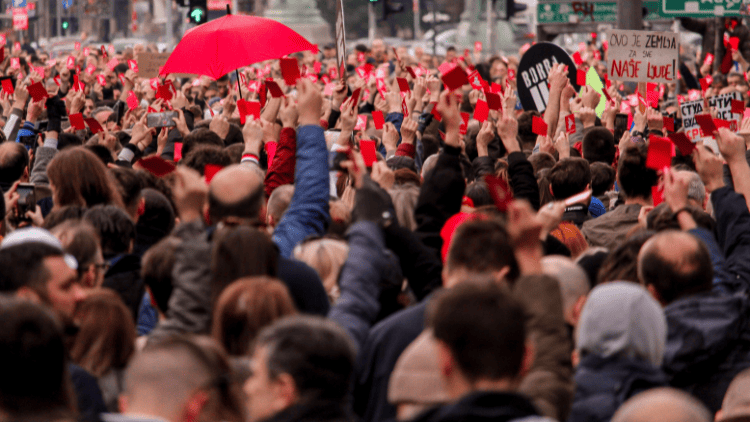Click here to become a member
And since the elections, he has shown no sign of relenting. In response to the reported irregularities, re-elections were called at 30 polling stations. But the final results did not change and the fraud allegations did not stop.
Vučić appears to be drifting further away from aligning with EU foreign policy too, despite appearing to support European values and enlargement in public speeches. Notably, Serbia did not join sanctions against Russia and has embraced closer economic ties to China, signing a free trade deal in October.
More recently, Vučić has said that he will not jeopardise Serbia’s European future or its ‘friendships with China and Russia’. In August last year, the EU assessed Belgrade’s foreign-policy alignment at 51 per cent—a few months on, it is likely to have ticked below 50. Such a balancing act may well add to a long list of stumbling blocks for Serbia’s European path.
Political manoeuvres
Vučić’s reluctance to align with the EU on the world stage or in its democratic processes risks not only Europe’s enlargement project but could weaken its ability to strengthen security in its eastern neighbourhood. In particular, failure to mediate and incentivise democratic recovery could create greater room for political manoeuvres by third countries, pulling Serbia further away from its western neighbours. In recent years, Russia, China and the Gulf states have all been acquiring significant space in Serbia’s political arena.
Moreover, if Serbia continues to drift towards such actors, the EU could lose Serbia’s economy to foreign markets. This could also be damaging for Serbia: while EU grants and financial support might seem too policy-constrained, foreign funds do not seem less connected to obligations or dependence. Lastly, worsening political rights, including the persistent use of police force to sedate protests and intimidate journalists and the imprisonment of protesters, could push more Serbians to migrate west—depleting Serbia’s labour market and increasing migration at a time when many European leaders are trying to push numbers lower.
Continuing with Serbia’s accession despite its trajectory could however have high political costs. For the EU, it risks importing another illiberal figure like Viktor Orbán, the Hungarian prime minister—who may veto European objectives, such as funding for Ukraine or the accession of other Balkan countries—and could further undermine Europe’s hand when it comes to enforcing a strong rule of law, media freedom and democratic standards.
Point of reference
But the EU has not lost Serbia to illiberalism just yet. The European Parliament aims to reach a resolution on how to respond to the Serbian elections today. The EU should focus on finding a more effective way to communicate with liberal Serbian political actors to present itself as a point of democratic and foreign-policy reference—and a support to be counted on.
While Vučić himself does not seem to be particularly interested in establishing an authentic relationship with the EU, mediation through less hardline Serbian politicians would be more strategic and potentially open more doors to the required reforms. In line with such a policy, the EU should also be willing to address Serbia’s refusal to recognise Kosovo and support such actors in reaching a bilateral resolution to a dispute that has long delayed accession.
At the same time, the EU should take a strong stance against signs of illiberal decay. Europeans should closely monitor the democratic situation in Serbia and be ready to take clear actions in case of further instability, remaining firm on the consequences this could have for Serbia’s accession process.
European policy-makers should keep in mind that preserving internal strength and common political visions is essential. For this reason, creating more effective mediation channels and reinforcing support for reforms, while remaining firm on the consequences of illiberal behaviours, could create a more genuine alignment between Belgrade and Brussels.
Demonstrating both solidarity and solidity with less hardline political actors could be key to opening up Serbia’s political processes to greater pluralism. While the EU cannot reverse Vučić’s democratic backsliding, it may be able to reverse Serbia’s. It owes it to the Serbians who have been demonstrating to be more European than ever, and who are showing us all how difficult and risky it is to take care of our democracies.
This was first published by the European Council on Foreign Relations
Angelica Vascotto is a pan-European fellow at the European Council on Foreign Relations. She is based in ECFR’s Rome office, where she works on security, the role of technology in international relations, European Union enlargement and the Balkans.
Source link : https://www.socialeurope.eu/backsliding-in-belgrade-serbias-european-future
Author :
Publish date : 2024-02-08 08:00:00
Copyright for syndicated content belongs to the linked Source.
